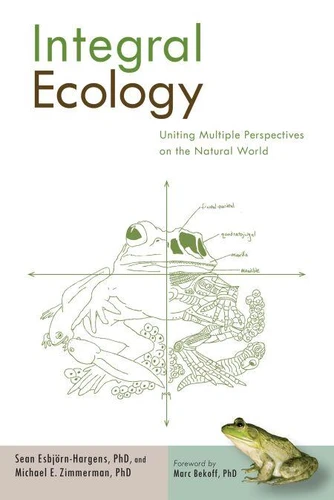Integral Ecology. Uniting Multiple Perspectives on the Natural World
Par : , ,Formats :
Disponible dans votre compte client Decitre ou Furet du Nord dès validation de votre commande. Le format ePub protégé est :
- Compatible avec une lecture sur My Vivlio (smartphone, tablette, ordinateur)
- Compatible avec une lecture sur liseuses Vivlio
- Pour les liseuses autres que Vivlio, vous devez utiliser le logiciel Adobe Digital Edition. Non compatible avec la lecture sur les liseuses Kindle, Remarkable et Sony
- Non compatible avec un achat hors France métropolitaine
 , qui est-ce ?
, qui est-ce ?Notre partenaire de plateforme de lecture numérique où vous retrouverez l'ensemble de vos ebooks gratuitement
Pour en savoir plus sur nos ebooks, consultez notre aide en ligne ici
- Nombre de pages832
- FormatePub
- ISBN978-0-8348-2446-1
- EAN9780834824461
- Date de parution08/03/2011
- Protection num.Adobe DRM
- Taille4 Mo
- Infos supplémentairesepub
- ÉditeurIntegral Books
Résumé
Today there is a bewildering diversity of views on ecology and the natural environment. With more than two hundred distinct and valuable perspectives on the natural world-and with scientists, economists, ethicists, activists, philosophers, and others often taking completely different stances on the issues-how can we come to agreement to solve our toughest environmental problems?In response to this pressing need, Integral Ecology unites valuable insights from multiple perspectives into a comprehensive theoretical framework-one that can be put to use right now.
The framework is based on Integral Theory, as well as Ken Wilber's AQAL model, and is the result of over a decade of research exploring the myriad perspectives on ecology available to us today and their respective methodologies. Dozens of real-life applications and examples of this framework currently in use are examined, including three in-depth case studies: work with marine fisheries in Hawai'i, strategies of eco-activists to protect Canada's Great Bear Rainforest, and a study of community development in El Salvador.
In addition, eighteen personal practices of transformation are provided for you to increase your own integral ecological awareness. Integral Ecology provides the most sophisticated application and extension of Integral Theory available today, and as such it serves as a template for any truly integral effort.
The framework is based on Integral Theory, as well as Ken Wilber's AQAL model, and is the result of over a decade of research exploring the myriad perspectives on ecology available to us today and their respective methodologies. Dozens of real-life applications and examples of this framework currently in use are examined, including three in-depth case studies: work with marine fisheries in Hawai'i, strategies of eco-activists to protect Canada's Great Bear Rainforest, and a study of community development in El Salvador.
In addition, eighteen personal practices of transformation are provided for you to increase your own integral ecological awareness. Integral Ecology provides the most sophisticated application and extension of Integral Theory available today, and as such it serves as a template for any truly integral effort.
Today there is a bewildering diversity of views on ecology and the natural environment. With more than two hundred distinct and valuable perspectives on the natural world-and with scientists, economists, ethicists, activists, philosophers, and others often taking completely different stances on the issues-how can we come to agreement to solve our toughest environmental problems?In response to this pressing need, Integral Ecology unites valuable insights from multiple perspectives into a comprehensive theoretical framework-one that can be put to use right now.
The framework is based on Integral Theory, as well as Ken Wilber's AQAL model, and is the result of over a decade of research exploring the myriad perspectives on ecology available to us today and their respective methodologies. Dozens of real-life applications and examples of this framework currently in use are examined, including three in-depth case studies: work with marine fisheries in Hawai'i, strategies of eco-activists to protect Canada's Great Bear Rainforest, and a study of community development in El Salvador.
In addition, eighteen personal practices of transformation are provided for you to increase your own integral ecological awareness. Integral Ecology provides the most sophisticated application and extension of Integral Theory available today, and as such it serves as a template for any truly integral effort.
The framework is based on Integral Theory, as well as Ken Wilber's AQAL model, and is the result of over a decade of research exploring the myriad perspectives on ecology available to us today and their respective methodologies. Dozens of real-life applications and examples of this framework currently in use are examined, including three in-depth case studies: work with marine fisheries in Hawai'i, strategies of eco-activists to protect Canada's Great Bear Rainforest, and a study of community development in El Salvador.
In addition, eighteen personal practices of transformation are provided for you to increase your own integral ecological awareness. Integral Ecology provides the most sophisticated application and extension of Integral Theory available today, and as such it serves as a template for any truly integral effort.



